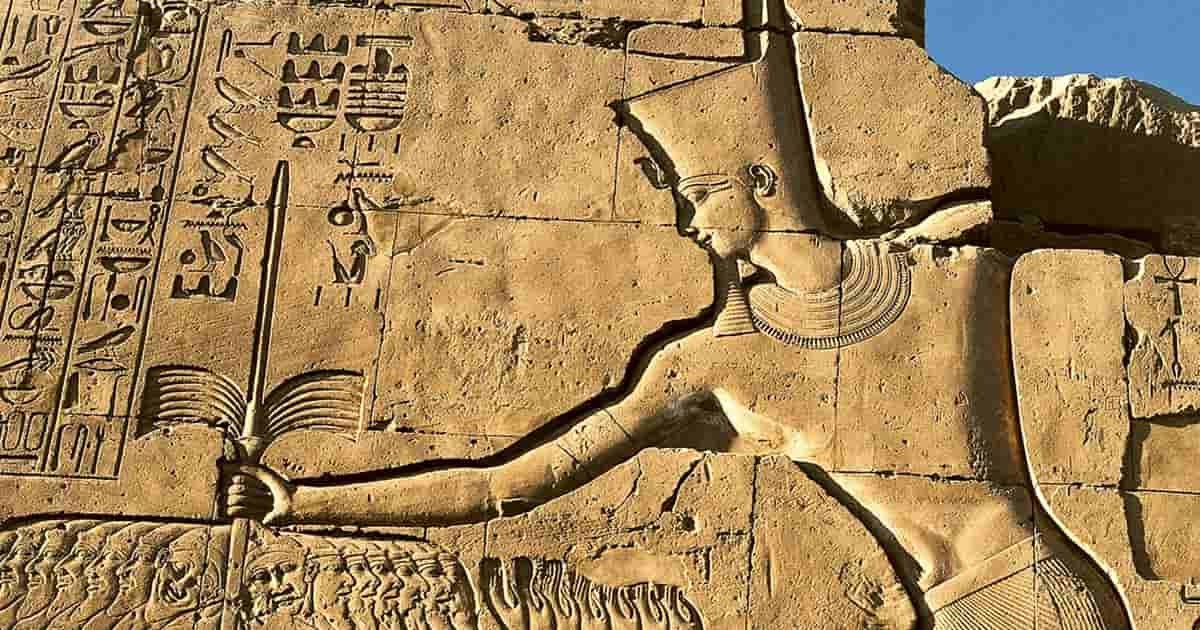
Thutmose III, the sixth pharaoh of Egypt's 18th dynasty, is celebrated for his remarkable military campaigns, especially in Syria. His reign from 1458 to 1425 BCE saw Egypt's empire expand significantly. Thutmose III led at least 17 successful military campaigns, capturing over 350 cities. His strategic use of chariots, surprise attacks, and logistical prowess made him a formidable leader. The Battle of Megiddo stands out as a key victory, showcasing his tactical genius. Beyond warfare, Thutmose III's administrative skills ensured the loyalty of conquered regions, enriching Egypt and securing its dominance. His legacy endures as one of history's greatest warrior-pharaohs.
Thutmose III: The Warrior Pharaoh
Thutmose III, the sixth pharaoh of Egypt's 18th dynasty, is celebrated for his military genius and strategic prowess. His campaigns in Syria are particularly noteworthy, showcasing his ability to expand Egypt's influence and wealth. Let's explore some fascinating facts about his Syria campaigns.
-
Inheritance and Early Reign
Thutmose III inherited the throne after his father, Thutmose II, passed away. However, he was too young to rule, so his stepmother, Hatshepsut, became pharaoh. Thutmose III was named co-regent but only became the sole ruler after Hatshepsut's death in 1457 BCE. -
Military Ambition
Thutmose III had a burning ambition for military success. He led at least 17 military campaigns, capturing over 350 cities without losing a single battle. These victories made Egypt incredibly wealthy. -
Advantage of Chariots
The introduction of horse-drawn chariots by the Hyksos gave Thutmose III a significant edge in warfare. He effectively used this technology to dominate his enemies. -
Logistical Skills
Thutmose III was a logistics master. He ensured his troops had a steady supply of provisions, allowing them to sustain long campaigns and surprise their enemies. -
Surprise Attacks
Known for his surprise attacks, Thutmose III often chose unexpected routes to catch his enemies off guard. One famous campaign involved marching his army through a narrow defile over the mountains to surprise the enemy at Megiddo.
The Battle of Megiddo and Beyond
The Battle of Megiddo is one of Thutmose III's most famous military engagements. His strategic brilliance shone through in this campaign and many others.
-
Battle of Megiddo
Thutmose III marched his army into what is now northern Israel, choosing a narrow mountain path. The enemy was caught off guard, and after an eight-month siege, Megiddo was captured. -
Pontoon Boats and Euphrates River
In his eighth campaign, Thutmose III built pontoon boats to cross the Euphrates River, surprising the enemy who did not expect him to cross at that point. -
Expansion Strategy
Thutmose III preferred attacking weak, poorly defended cities or regions. This approach allowed him to quickly conquer territories and establish a strong foothold in the region. -
Administrative Organization
After his campaigns, Thutmose III set up an imperial organization in his Asian possessions. Native rulers became vassals of Egypt, bound by oath to keep peace, render annual tribute, and obey the Egyptian representative. -
Education of Captured Nobles
Thutmose III brought the noble children of defeated kings to Egypt for education. These children, held as hostages, were educated at court, ensuring future loyalty to Egypt.
Recording and Consolidating Victories
Thutmose III's victories were meticulously recorded, and he took steps to consolidate his gains, ensuring long-term stability and prosperity for Egypt.
-
Military Scribe Tjaneni
Thutmose III's victories were recorded by his private secretary, Tjaneni. His journal, later deposited at the Temple of Amun in Thebes, detailed the Battle of Megiddo and other campaigns. -
Consolidation of Gains
In later campaigns, Thutmose III focused on consolidating his conquests. He built fortresses, stationed garrisons at key points, and established governance systems to ensure loyalty. -
Nubian Campaigns
Thutmose III reaffirmed Egypt's southern boundary over Nubia, building a temple to Amon at Napata and subduing the Nubian tribes. Many Nubians were employed in gold mines, enriching Egypt further. -
Economic Prosperity
The spoils from Thutmose III’s campaigns, including plunder, taxes, and tribute, vastly enriched Egypt’s treasury. Tribute from Syria and Palestine poured in, along with timber, metal ores, cattle, and grain. -
Foreign Envoys and Gifts
Minoan Crete, Cyprus, Babylonia, Assyria, and the Hittites sent gifts to Thutmose III. Tombs of high officials from his reign depict scenes of foreign envoys bringing rich and exotic gifts to the pharaoh.
Legacy and Historical Records
Thutmose III's legacy extends beyond his military conquests. His reign is well-documented, providing valuable insights into his strategies and leadership.
-
Legacy and Impact
Thutmose III elevated Egypt's status as a powerful and prosperous nation. His military campaigns set the stage for Egypt's continued expansion and prosperity. -
Historical Records
The records of Thutmose III's campaigns are extensive and detailed. The annals of his reign provide a comprehensive account of his military exploits, including the Battle of Megiddo. -
Temple Inscriptions
Temple inscriptions at Karnak and other locations throughout Egypt provide vivid accounts of Thutmose III's military campaigns, highlighting his strategic thinking and leadership skills. -
Personal Characteristics
Thutmose III was known for his bravery, strategic thinking, and diplomatic skills. He was a skilled hunter and statesman who managed both the administrative and military aspects of his empire effectively. -
Enduring Legacy
Thutmose III's legacy has endured for millennia. He is remembered as one of the greatest pharaohs in Egyptian history, with his military campaigns setting the stage for Egypt's continued expansion and prosperity. His impact on Egyptian society and culture is still studied and admired today.
Thutmose III's Lasting Impact
Thutmose III's Syria campaigns were game-changers for ancient Egypt. His strategic brilliance, use of chariots, and surprise attacks made him a military legend. The Battle of Megiddo stands out as a masterclass in warfare, showcasing his knack for logistics and surprise tactics. His administrative skills ensured that conquered territories remained loyal, with native rulers acting as vassals to Egypt. The wealth and resources from these campaigns enriched Egypt, making it a powerhouse in the ancient world. His policy of educating captured nobles' children in Egypt ensured long-term loyalty. Thutmose III's legacy is etched in temple inscriptions and historical records, highlighting his bravery, strategic mind, and fair treatment of enemies. His reign set the stage for Egypt's continued expansion and prosperity, making him one of history's greatest warrior-pharaohs. His impact is still studied and admired today, cementing his place in history.
Was this page helpful?
Our commitment to delivering trustworthy and engaging content is at the heart of what we do. Each fact on our site is contributed by real users like you, bringing a wealth of diverse insights and information. To ensure the highest standards of accuracy and reliability, our dedicated editors meticulously review each submission. This process guarantees that the facts we share are not only fascinating but also credible. Trust in our commitment to quality and authenticity as you explore and learn with us.


